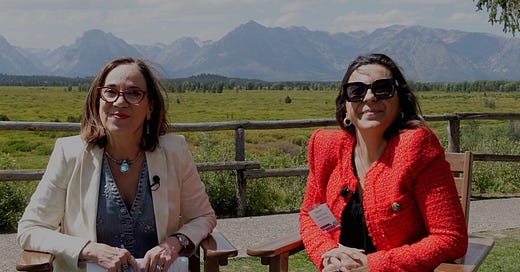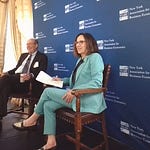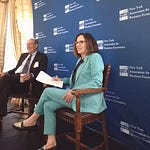Brown University economist Sebnem Kalemli-Ozcan is a regular participant at the Kansas City Fed’s annual Jackson Hole symposium and a keen follower of global central banking. Like many other at the event this year, she is convinced the Federal Reserve is going to cut its key rate next month after Chair Powell’s opening speech all but announced the monetary policy tide has turned from tamping down inflation to putting a ceiling on rising unemployment.
”The key words in the speech are ‘the time has come,’” Sebnem says.
Last year’s speech focused solely on the need to reduce inflation and didn’t say anything about the economy, unemployment, the labor market. The wording in Powell’s speech this year signals “the time has come in terms of now we can go back to normal because there (are) these signs of weakening in the labor market,” she adds, predicting a 25 bps cut will be plenty to achieve this.
Sebnem is also one the foremost experts in the world in international economics. As such she bring a key global connection to the table. She is watching how the Fed’s expected policy pivot will feed into a bigger global moves to cut rates - from the European Central bank to the Reserve Bank of New Zealand and to emerging market central banks like Brazil - as global disinflation continues.
”Everybody started cutting,” she notes, adding that as Fed rate cuts start they will especially help emerging market currencies.
“It’s actually a synchronized move. In fact, you know everybody started before the Fed except the Bank of Japan,” she says.” As the BOJ remains the “odd man out” as it hikes rates and is expected to do more, the yen will keep rising and that will be “bad news for the yen carry trade people.”
Also hear, see what Sebnem has to say as she looks at large and growing debt burdens around the world, and the impact of growing fiscal burdens on central banks’ monetary policies including the Fed.
Şebnem Kalemli-Özcan is Schreiber Family Professor of Economics at Brown University and the Director of the Global Linkages Lab. She is a Research Associate at the National Bureau of Economic Research (NBER) and a Research Fellow at the Center for Economic Policy Research (CEPR). Currently, she is the co-editor of American Economic Journal: Macroeconomics. She also serves at the economic advisory panels of the NY Federal Reserve and the Bank of International Settlements.
She was the Duisenberg Fellow at the European Central Bank, held a position as Lead Economist/Adviser for the Middle East and North Africa Region, served as the Houblon-Norman Fellow of Bank of England and also CFR International Affairs Fellow. She was the Senior Policy Advisor and Assistant Director at the International Monetary Fund. She is the first Turkish social scientist who has received the Marie Curie IRG prize in 2008 for her research on European financial integration.
Her research focuses on the impact of international trade and financial linkages on domestic business cycles and growth. Using global granular micro data on firms, banks, investors, and financial transactions, she studies relationships between micro financial linkages and macro real outcomes such as capital flows, currency movements, investment and employment.













Share this post